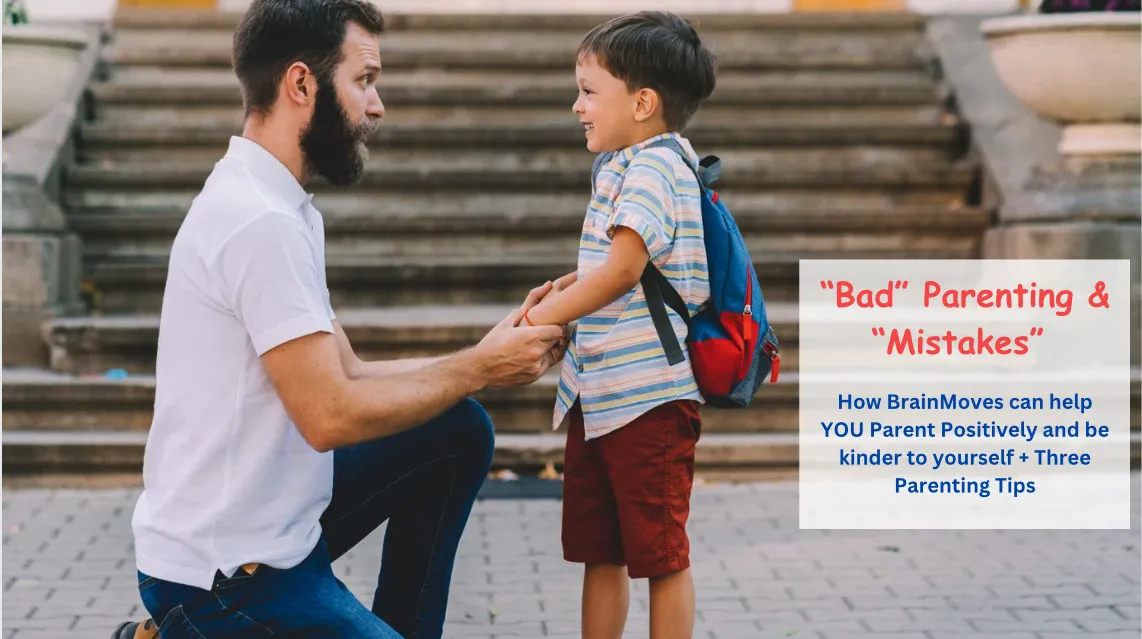
“BAD” Parenting and “MISTAKES.” How BrainMoves can help YOU Parent Positively and be Kinder to Yourself + Three Parenting Tips
Being a mother or father to a preschooler can feel like an impossible job. If it is your first child or your third, sometimes you may feel like you are one day before a complicated review and you forgot to hand in a work project or that you have been given a new role but have no onboarding for how it should happen.
Of course, mistakes will happen. Your child is unique; you are unique. Every situation is unique. There is no guidebook. There’s also no black and white. Remember that part of childhood development is transitioning from black-and-white thinking into a more nuanced way of reviewing our world. When we’re stressed, we, as adults, can sometimes revert back to that childhood black-and-white thinking.

What does this mean for parenting? You may feel a situation is disastrous: Maybe you’ve said the wrong thing and the child cried, you lost your temper, or maybe you forgot something important like a parent-teacher meeting or a doctor’s appointment. Perhaps you simply overcommitted yourself and you don’t feel “present.” In that moment it may feel like the exact opposite of what should have happened HAS happened and you feel guilty. Your brain could process this as “Oh, that was a mistake. That was BAD.”
All of these situations- the poor word choice, the missed commitment, the over promise can happen. They are facts of life. But when we categorize them as “good” or “bad” and take on the associated guilt, it doesn’t actually move the process of parenting forward.
This week’s overall parenting tip is to simply apologize if you’ve made a mistake and move on.
I often say that my BrainMoves movements are fantastic for adults as well: When you are in the black and white thinking world of “MISTAKE!” it is a great time to regulate your own nervous system.
Take some deep breaths, do the StartUp Six, and start again.

Here are three ways you can overcome parenting situations that can feel like mistakes.
Situation 1: You make a promise or offer a reward you cannot fulfill.
You tell the child that they can have something special to eat as a reward for doing a chore or being patient, then you realize that you are out of that special snack.
Solution: Apologize. Tell the child, “I’m sorry, I didn’t realize that we were out of cookies.” Take a deep breath, let the child process that, and then invite a solution. This could involve offering the child other things or, even better, letting the child make a decision about what they would like as a reward based on what is in the house. Maybe what they actually want to do is play a game with you or go for a walk with you and the dog. This can turn into a positive parenting moment where you create a moment of safe autonomy for your child.
Situation 2: You drop or break something that the child wants and the child has a meltdown because now it’s imperfect. This can be complicated. I have seen children have meltdowns when they’re overtired and their slice of pie breaks in half. I have also witnessed children have a meltdown when they see that a stuffed toy, which you convinced them to put in the washing machine, is losing a bit of stuffing.
Solution: You may remember from an earlier blog post that children don’t have great object permanence; it’s a developing idea in children and in preschoolers and it's incomplete. A broken item can feel completely “gone” in their mind. When an object suddenly changes in front of them, particularly a beloved or much-desired object, it feels as though the object might have been taken away. This parenting “mistake” can cause you to feel instantly guilty.
Take a moment to breathe deeply. When you breathe in through your nose and exhale through your mouth it helps to regulate your nervous system. We breathe this way in many of the BrainMoves movements to help your child (and you) feel calmer.
When you practice breathing this way I hope you notice that taking deep, patient breaths is the first step in managing most parenting stresses. Then model the language out loud that you’d like the child to process in their head. “Oops, looks like that piece of pie broke; it’s a good thing it’s still going to be delicious.” Or, “Hey there, Teddy Bear, it looks like you need a needle and some thread now that you’re all clean.” If it’s truly an unsolvable problem, again look at the child and apologize. As calmly as possible, explain what’s next. “I’m sorry, it looks like your Teddy has lost a leg. We can put it back on, but we’re going to have to be extra gentle with him from now on. I think your Teddy is going to need to be a friend that lives on your bed. Maybe there’s another animal toy you can bring to Grandma’s?”
Situation 3: You Shout, Slam, or Stomp. Children can be infuriating and frustrating, and everyone eventually

reaches their edge of ability to cope. Sometimes this means that we shout at the child. Shouting does nothing positive for either of our or our child’s nervous system. When we are calm, we should reflect on what caused us to shout and realize that this was a boundary that was suddenly jumped over. If we were unaware that we had a boundary there, it’s an opportunity for us to learn a bit about ourselves, both as parents and as human beings as a whole.
Solution: Again, apologize because we did not model the behavior that we would like the child to engage in. When you’re calm, explain why you became loud and shouted, but do so in a way that describes what your nervous system was doing rather than labeling the child as good or bad. Instead of saying, “You did something bad that made Mommy very, very angry,” try saying, “I love you, but I was really frustrated and worried when you chased the ball down the driveway. It’s not safe to do that because there’s traffic, and traffic doesn’t know you’re there and could come into the road. I shouted at you because I was worried. Sometimes people get really loud when they’re afraid or frustrated. Can you tell me the rule we have about playing in the driveway and playing in the yard?”
In this example, the mother first apologized and then explained her feelings and ended with letting the child restate the boundary so that the child felt in control of keeping mommy happy in the most positive way possible.
Most of all, give yourself time, space, and grace. Being a parent to a preschooler is a challenging and wonderful job.
Doing BrainMoves for yourself can help you be more peaceful, patient, focused, and considerate when your child does things that are baffling, confusing, or frustrating.
Having a brain that is content and focused will help you roll with everything that life with a preschooler can offer.
In just five minutes a day you can learn how to do BrainMoves with your child and both of you will be happier, more focused, and more content. You can sign up for the self-paced BrainMoves course today. Just follow the link below. https://thebrainmovescourse.com/#custom-code-h8-M12CN4iJ

